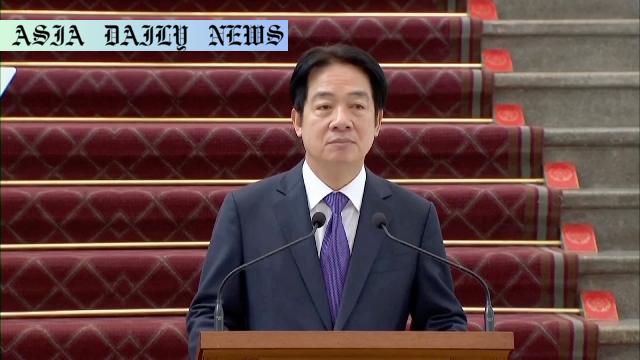Chip Trade: Taiwan President Lai vows to communicate with the US to address semiconductor trade concerns and resolve tensions amicably.
Taiwan President Lai emphasizes amicable discussions with the US over semiconductor trade concerns.
Proposes Taiwan’s dedication to finding resolutions to maintain economic cooperation and bolster defense investments.
Plans for increased defense spending reflect Taiwan’s stance on peace and cross-strait stability.

Taiwan’s Stance on Semiconductor Trade Tensions
Taiwan’s President Lai Ching-te has reaffirmed his administration’s commitment to resolving tensions with the United States over the semiconductor trade. The issue stems from statements made by US President Donald Trump, who expressed concerns that Taiwan’s semiconductor industry has negatively affected the US chip business. Trump emphasized the need for the US to regain a share of the chip manufacturing sector, highlighting the significance of the industry to both economies.
Collaborative Efforts to Address Concerns
President Lai responded by pledging to communicate directly with the US government and Taiwan’s semiconductor stakeholders to devise effective solutions. Recognizing the critical role semiconductors play in global technology and the economy, Lai emphasized that his administration would engage in constructive discussions to protect Taiwan’s reputable position as a global chip leader while accommodating US economic concerns. Proposals aimed at fostering collaboration and sustainable trade ties are reportedly in development.
Bolstering Defense as a Strategic Priority
Beyond the semiconductor discussions, Taiwan is demonstrating its commitment to regional security by increasing its defense budget. President Lai announced plans to propose a special budget that would raise defense spending to more than 3 percent of the nation’s GDP. This measure aims to reinforce Taiwan’s military capabilities amidst mounting tensions across the Taiwan Strait. By adopting this strategy, Taiwan underscores its dedication to safeguarding the island’s sovereignty and contributing to stability in the region.
Highlighting Existing Taiwan-US Cooperation
President Lai also reiterated Taiwan’s longstanding partnership with the United States. His administration has maintained close ties with the Trump administration since its inception, working on various initiatives to promote mutual interests. Lai emphasized the importance of sustaining this relationship to navigate complex issues such as semiconductor trade and geopolitical threats posed by China’s increased military activity and assertive policies.
Peace and Prosperity through Diplomacy
One of Lai’s key messages was his determination to resolve disagreements through diplomatic channels. By fostering open communication and dialogue, Taiwan seeks to ease trade concerns while safeguarding its economic interests. The semiconductor industry serves as a cornerstone of Taiwan’s economy, and Lai acknowledged this by stressing the need to balance domestic priorities with international relationships.
The Global Spotlight on Semiconductor Supply Chains
The tensions surrounding chip production and trade are reflective of broader global supply chain disruptions, particularly in the wake of the COVID-19 pandemic and escalating US-China trade disputes. Taiwan’s semiconductor industry, largely driven by companies like TSMC, plays a pivotal role in supplying advanced chips used in industries ranging from automotive to consumer electronics.
Future Prospects for Taiwan-US Engagement
The resolution of semiconductor trade disputes may open up further opportunities for Taiwan and the US to deepen their economic ties. Joint investments in research and development, technological advancements, and workforce training could pave the way for a more balanced and mutually beneficial partnership.
Commentary
The Importance of Diplomacy in Semiconductor Trade
As Taiwan and the United States seek to address their semiconductor trade concerns, one clear takeaway is the indispensability of diplomacy. Taiwan’s commitment to open communication and discussions with the US is a testament to its understanding of the global significance of semiconductors. The industry is not merely an economic asset but a critical component of technological advancement and national security for both nations.
Taiwan’s Balancing Act
President Lai’s response embodies the delicate balance Taiwan maintains as it navigates geopolitical pressures and domestic priorities. On one side, there is an urgent need to retain Taiwan’s dominance in the semiconductor sector, which has earned it the title ‘Silicon Shield.’ On the other, Lai must consider the US-led demand for reshoring manufacturing and reducing dependency on foreign sources for critical technologies.
The Role of Defense in Economic Stability
Beyond trade, Lai’s proposal to increase Taiwan’s defense spending echoes a broader trend of nations strengthening their military capabilities amidst global uncertainties. This approach aligns with Taiwan’s strategic objective of maintaining peace and stability across the Taiwan Strait, especially as geopolitical threats continue to loom. Defense and economic ties often go hand in hand; addressing one serves to bolster the other.
Looking Ahead
The coming months will be crucial as Taiwan and the US work toward impactful resolutions that serve both nations’ interests. If successfully navigated, this situation could set a precedent for other countries reliant on global supply chains. In summary, Taiwan’s proactive stance is a sign of its resilience and determination to thrive in an increasingly interconnected and competitive world.


